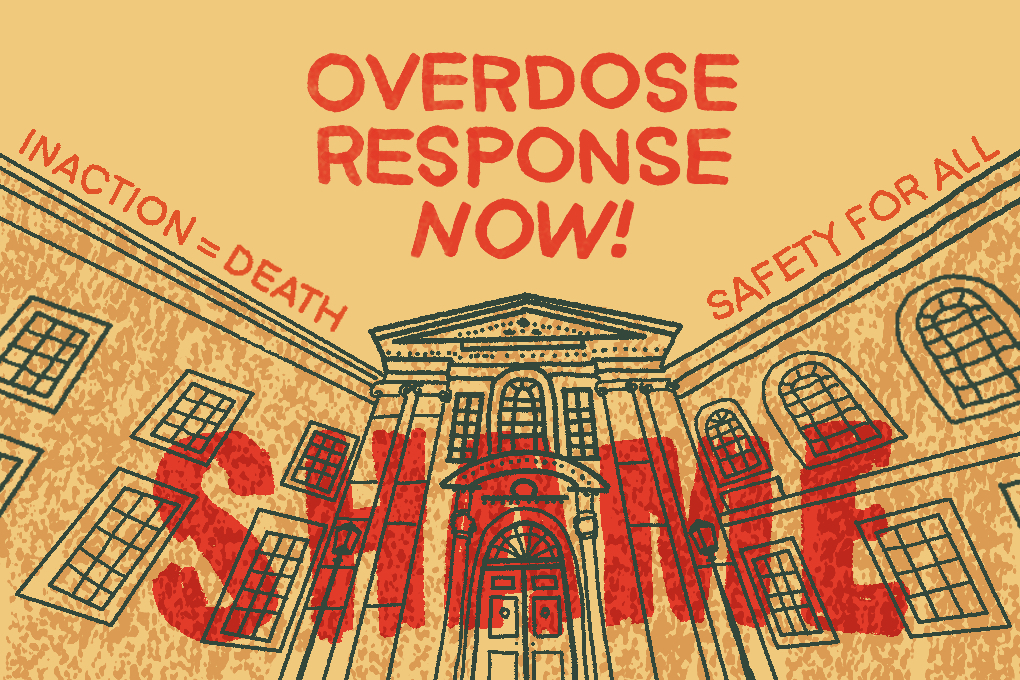Dear President Gertler,
Canada is experiencing an unprecedented overdose crisis, primarily due to the unregulated toxic drug supply. Toronto has one of the highest overdose mortality rates in the country, reporting 530 opioid overdose deaths in 2020 — an 81 per cent increase from the previous year. One of the most immediate ways to prevent a fatal opioid-related overdose is by administering naloxone, a fast-acting opioid antagonist. Naloxone can save lives, but it must be on hand, and the person administering the medication must know how to administer it properly and must be able to recognize the signs of an opioid overdose.
In the midst of a national overdose crisis — and in the absence of decriminalization, legalization, or harm reduction-oriented drug policies that would ensure a safer regulated drug supply — low-barrier harm reduction measures, such as naloxone distribution and overdose prevention training, are crucial for minimizing the risk of fatal overdoses.
At present, the University of Toronto does not require its emergency, security, or residence staff to carry naloxone or be trained in overdose response measures, nor does it offer overdose response training to students on a regular basis or provide naloxone kits anywhere on campus.
Among the major universities in Ontario, the University of Toronto remains the only institution without overdose response measures in place to prevent overdose deaths on campus. As an anchor institution located in a city disproportionately affected by overdose mortality, the University of Toronto has an obligation to its students, as well as the broader community in which it operates, to implement a robust harm reduction-focused approach to drug safety. The lack of action thus far is indefensible.
We know that students want the University of Toronto to take overdose prevention and response seriously. In the absence of any naloxone training efforts on campus, our student group organized the first of several comprehensive on-campus and online overdose response training sessions, which began in 2019. These training sessions have been attended by hundreds of students from a broad range of disciplines, each of whom recognized the importance of being able to respond to an overdose emergency. Several groups on campus have also approached us about organizing overdose response training for their members.
Over a hundred students and faculty have also signed our petition urging clinical programs at the university to implement harm reduction education and overdose response training as part of their formal curriculum. Signatories included students and faculty from the medicine, nursing, pharmacy, public health, social work, and information faculties, as well as the Ontario Institute of Studies in Education and the Faculty of Arts & Science. In their feedback, they recognized the need for widely available training on campus and expressed disappointment in the lack of leadership demonstrated by the school in meeting a very basic need.
The fact that we, a student-led group, have come to bear the responsibility for securing funding, hiring facilitators, and obtaining naloxone kits in order for the student body to receive this life-saving training is an egregious failure of the university administration who continue to ignore this issue. We are ill-equipped to meet this need for the entire campus community; moreover, we do not feel it should be our responsibility given the resources the University of Toronto has at its disposal.
Training frontline university staff and making naloxone kits available on campus is a necessary first step that the university must take in the collective fight against the overdose crisis that is devastating our city. While we are firmly committed to an abolitionist framework and future, we recognize that addressing the immediate need of preventing overdose deaths on campus requires all frontline campus responders to be adequately equipped in the event of an overdose.
We, the University of Toronto Chapter of Canadian Students for Sensible Drug Policy. along with the groups listed below, are calling on you, President Meric Gertler, as the leader of this university, to work with your administration to implement the following measures immediately:
- Mandate overdose response training for all first responder staff on campus, including residence staff, emergency first responders, campus police, and campus security;
- Equip these groups with naloxone kits and training resources;
- Ensure that the Health & Wellness Centre provides easily accessible naloxone kits and regular, recurring overdose response training sessions for students and staff, preferably facilitated by a harm reduction worker.
Lives are at stake. You must take action now.
Signed,
University of Toronto Chapter of Canadian Students for Sensible Drug Policy
Amnesty International University of Toronto Scarborough
Black Medical Students’ Association
Black Social Work Student Association
Graduate Nurses’ Student Society
Graduate Student Association, Factor-Inwentash Faculty of Social Work
Health Students Fight Back at U of T Medicine
Institute of Health Policy, Management and Evaluation Graduate Students Union
Justice Rehab
Nursing Undergraduate Society
OISE International Students’ Association
Ontario Public Interest Research Group Toronto
Pharmaceutical Sciences Graduate Student Association
Public Health Students’ Association
The Empowerment Council: Systemic Advocates in Mental Health and Addiction
University of Toronto Emergency Medicine Interest Group
University of Toronto Faculty of Medicine Anti-Oppression Educators Group
University of Toronto International Health Programs Student Organization
University of Toronto Medical Society
University of Toronto Mississauga Students’ Union
University of Toronto Occupational Science and Occupational Therapy Student Association
University of Toronto Physical Therapy Student Council
University of Toronto Psychiatry Interest Group
University of Toronto Scarborough Campus Students’ Union
University of Toronto Students’ Union


